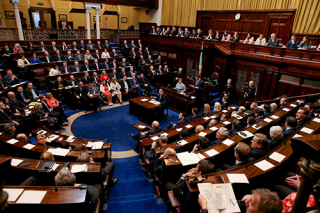Government's use of money message veto is undemocratic

The Government's over-use of the so-called 'money message veto' is undemocratic and is a mis-use of the Constitution.
According to Article 17.2 of the Constitution, “no law shall be enacted for the appropriation of revenue or other public moneys unless the purpose of the appropriation shall have been recommended to Dáil Éireann by a message from the Government signed by the Taoiseach”. In other words, bills being passed that require additional spending as a result of their implementation must receive approval for such expenditure from the Government of the day. So if it costs money – and most bills or laws do come with at least some attached cost for their implementation – then the government has the power to withhold funding and so prevent the passage of the bill.
The rationale behind Article 17.2 is simple enough: while the Government does not, strictly speaking, control the legislative process, it does have overall responsibility for managing the State’s finances. Article 17.2 attempts to ensure prudence in the State’s finances by keeping spending on a coherent agenda and making sure that conflicting legislation and spending does not come about.
This may sound reasonable enough, but in recent months, Government has faced growing criticism over its use of the ‘money message’ device to veto opposition legislation. Indeed, nearly all opposition bills with majority support in Dáil Éireann have subsequently been blocked by Government in this manner. This raises serious questions for how democracy in the Republic of Ireland functions. By one reckoning, of the first 68 opposition Bills to have passed their first Dáil votes during the current Dáil term, 55 have been deemed to require a money message, but the Government has granted only three. The rest of these bills effectively remain in limbo, unable to progress.
Part of the problem is that there is very little clarity as to what kind of costs are sizeable enough to trigger the need for a ‘money message’ in the first place. Because all legislation will require at least some form of implementation (and therefore some level of spending) by civil servants and/or State bodies, it is not clear where the line is drawn. Indeed, many of the grounds cited by Government are vague and unspecified. The situation has handed a minority Government a general power to override legislation passed by a democratic parliament, and this is cause for serious concern.
While there is a certain ambiguity around Article 17.2, the Government’s current use of it – which, if taken to its logical conclusion, would give Government general veto power over all legislative proposals, regardless of how much support there is for it in the Oireachtas – clearly runs against the idea of ‘democracy by majority vote’. The article was surely never intended to be used by a minority government to override legislation passed by a democratic parliament. This, unfortunately, is what has come to pass.
In the Irish Times in June 2019, Eoin Daly and David Kenny emphasised the need for politicians to distinguish fairly between bills whose primary purpose is to spend money and those which merely include some measure of indirect expenditure at the initial implementation stage.
They note that the phrasing used in the Constitution is quite specific in that it refers to laws “for the appropriation of revenue” i.e. whose purpose is to spend, and not laws which may have the effect of incurring some expenditure.
Daly and Kenny point out that current practice seems to be that the Ceann Comhairle and the Bills Office – which determine if a Bill requires a money message – have assumed that all such measures, even those involving minimal, indirect or incidental expenditure, fall under the ‘money message’ provision. Accordingly, Article 17.2 has been used to block or delay a variety of Bills, many of which seem to involve only incidental or minor expenditure. Government has by this point made such extensive use of the mechanism that it threatens, in a very real way, the constitutional law-making power of the national parliament.

GIVING A VOICE TO THOSE
WHO DON’T HAVE A VOICE
When you support Social Justice Ireland, you are tackling the causes of problems.
